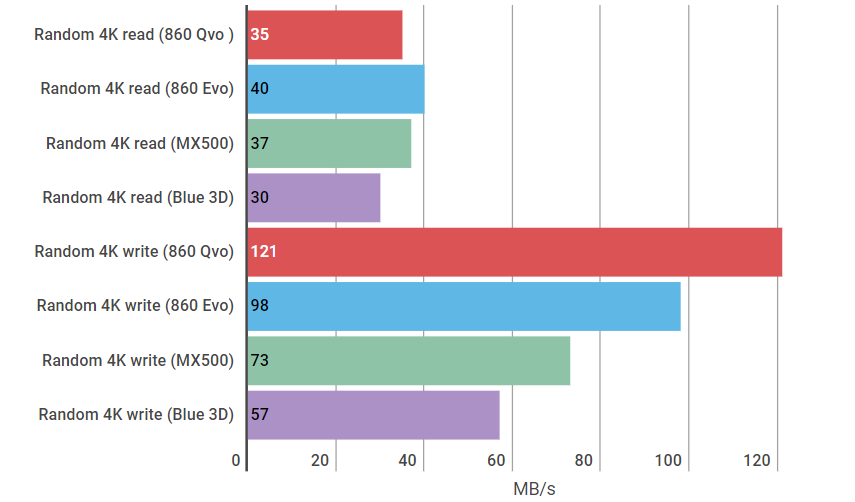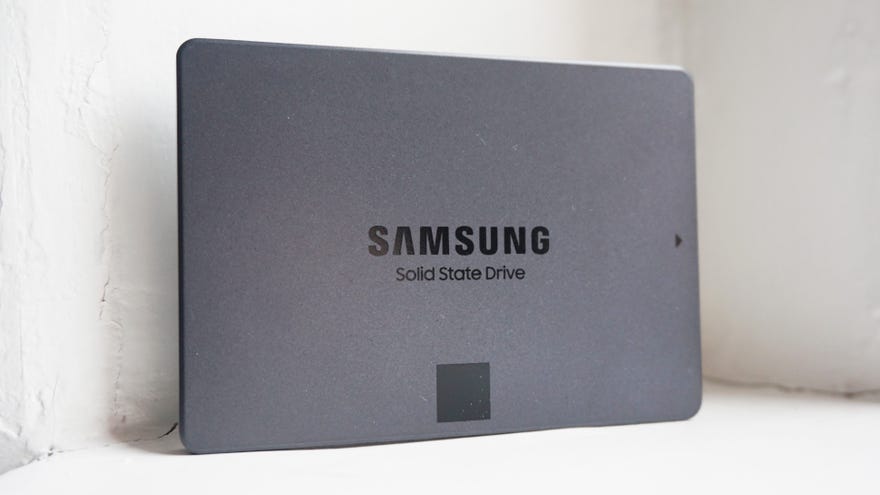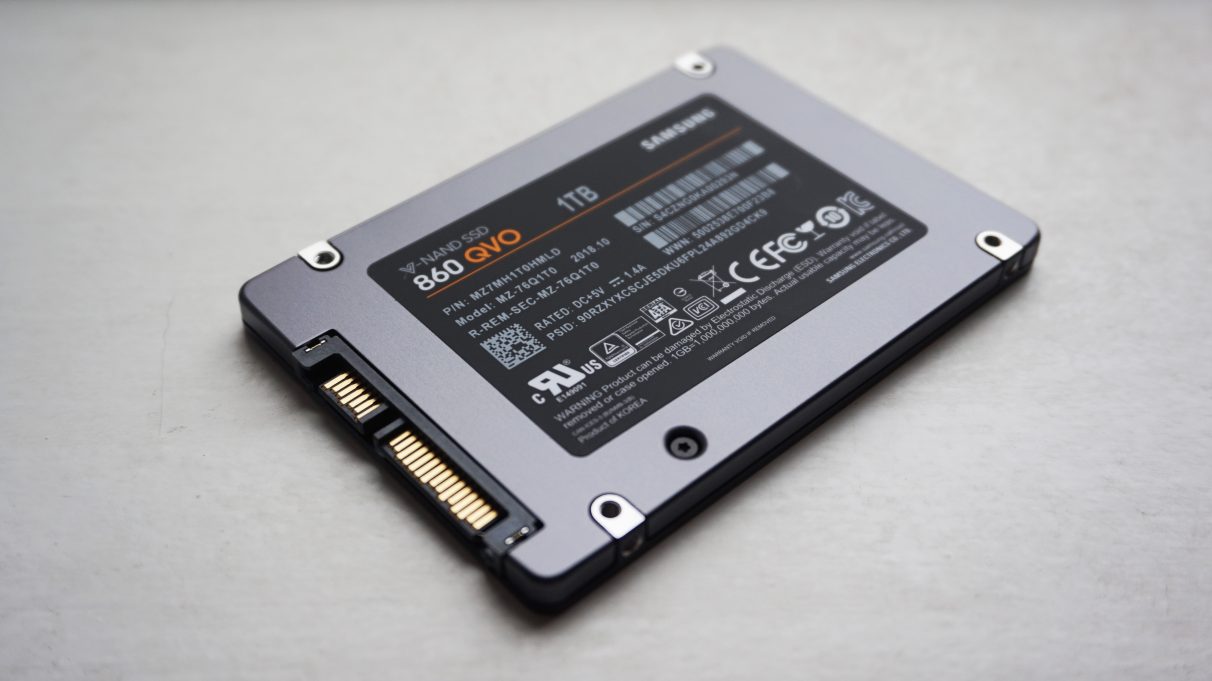Samsung 860 Qvo review: A fast, high-capacity SSD that's excellent value
4-bits of all right
Black Friday and sales madness aside, high capacity SSDs still cost an absolute fortune. It's the main reason why so many of us still opt for small 250-500GB SSDs as our primary drive, and make do with larger, slower HDDs for storing big things like games and photos. Samsung's brand-new 860 Qvo, however, hopes to change all that by offering jumbo storage pockets at a more affordable price.
Don't get me wrong. The entry-level 1TB model that's launching in mid-December will still set you back £137 in the UK and $150 in the US, so it's not like we're suddenly all going to be able to put massive SSDs in our PCs for an absolute pittance. However, when you compare that to the price of a 1TB Samsung 860 Evo (£160 / $170 at time of writing) and a 1TB Samsung 860 Pro (£300 / $287), the Qvo starts to make a lot more sense - and most importantly, its performance is pretty damn good, too.
On paper, it sounds like the perfect candidate for the best SSD ever made. After all, you're getting lots of storage for not as much money, and you've still got a decent three-year warranty and a 360 terabytes written (TBW) endurance rating on the entry-level 1TB model. Sure, the 860 Evo gives you five years and 600TBW on its 1TB size, but you're also paying that much more for it. Given the choice, I'd happily trade a longer warranty for a lower, overall price.
The reason why Samsung's suddenly been able to cut costs slightly is all to do with the 860 Qvo's new bitty innards. Not bits as in moving parts, but as in how many bits can be crammed into each storage cell inside the SSD. Whereas the 860 Evo and Pro used Samsung's 3-bit MLC (multi-level cell) V-NAND technology, the Qvo is the first Samsung SSD to up that to 4-bit, allowing for greater densities of storage (theoretically up to 16TB, according to Samsung) in the same 2.5in, 7mm form factor.
At the moment, Samsung's 860 Qvo line-up stops at 4TB (and is in fact limited to 8TB with their current MJX controller, which is also at the heart of the rest of Samsung's 860 family), but it should hopefully pave the way for much larger 2.5in 7mm SSDs in the future that don't cost the earth.
Now, as with any piece of tech, a lower price usually means some kind of compromise elsewhere. In the case of 4-bit MLC NAND technology more generally, this has been historically slower than 3-bit types of storage due to higher numbers of voltage levels needed in order to access the data. Samsung, however, have managed to work their storage wizardry on the 860 Qvo so it's effectively just as nippy as its Evo sibling - offering up to 550MB/s sequential read speeds and 520MB/s sequential write speeds across all three 1TB, 2TB and 4TB models.
In practice, my results came in just behind those quoted figures when I put it through AS SSD's 1GB sequential test, but its read speed of 492MB/s and write speed of 500MB/s are still pretty much on par with both the 860 Evo and Crucial's MX500, and a fraction ahead of WD's Blue 3D NAND.
That's pretty competitive considering its cheaper price, and the 860 Qvo continued to impress when I put it through AS SSD's 1GB random 4K test as well. After all, random speeds are a much more accurate representation of how fast an SSD will be in real life, as they tend to read and write data all over the shop rather than in nice, neat adjacent (or sequential) blocks.

Here, the 860 Qvo came in with a random read speed of 35MB/s, and a stonking random write speed of 121MB/s. The former is a touch behind the 860 Evo (just 12%), and a smidge slower than Crucial's MX500 (a mere 5%), but its write speed is way out in front of every other 2.5in SSD I've tested so far, so much so that's it's practically knocking on NVMe territory by comparison (the slowest of which I've recorded starts around 140MB/s).
That's not all, either, as the 860 Qvo also smashed through CrystalDiskMark's demanding 8-queue-8-thread test like it was nothing at all. This is meant to test high intensity workloads more befitting of a server or workstation than your average PC, but the 860 Qvo finished with a massive read speed of 1228MB/s and a write speed of 939MB/s. That's a respective 205% and 161% increase over my previous record holder, which is none other than Samsung's 860 Evo, showing the 860 Qvo is infinitely better suited to more heavy duty tasks than its Evo sibling.
All in all, the Samsung 860 Qvo is a fantastic SSD that should absolutely be at the top of your consideration pile for sizes at 1TB or above. Not only has it got the workhorse chops to deal with larger storage requests much faster than any other 2.5in SSD I've tested so far, but its random speeds are also just as good, if not considerably better than the rest of its 3-bit competition. Sure, its random read speed might not be absolutely best in class compared to other 2.5in SSDs out there, but the difference is so small that any offset in performance is more than made up for by its lower cost. If you finally want to bid goodbye to your old HDD and go for a single, large storage device as your main SSD, the Samsung 860 Qvo is a tough act to beat.










